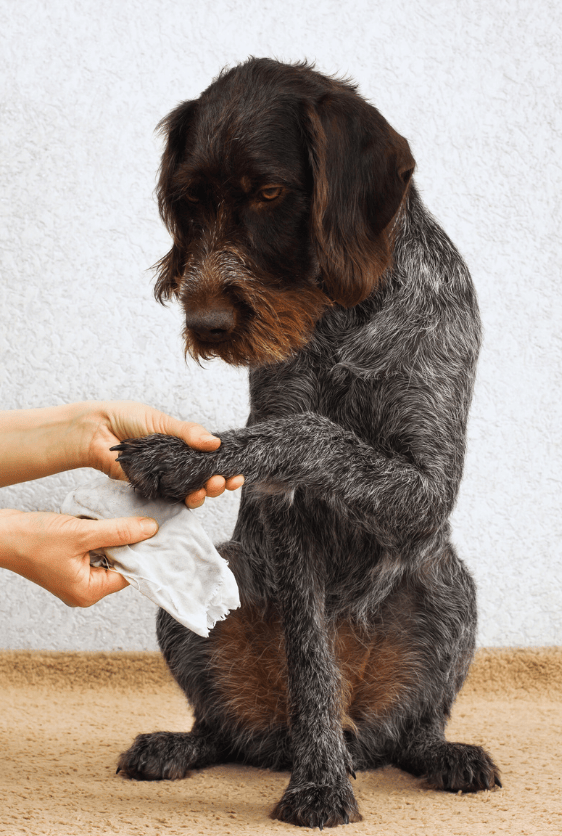Can You Use Baby Wipes on Dogs?

While regular baths are crucial, there are times when a quick clean-up is necessary between grooming sessions. Baby wipes often come to mind as a convenient solution, but can you use baby wipes on dogs? This article explores the safety, benefits, and potential risks of using baby wipes on your canine companion, along with alternative options for maintaining your dog’s hygiene.
About Baby Wipes
What Are Baby Wipes?
Baby wipes are moistened disposable cloths primarily designed for cleaning infants during diaper changes. They are formulated to be gentle on a baby’s sensitive skin, containing mild cleansers and moisturizers. The typical ingredients include water, mild surfactants, moisturizers like glycerin, and sometimes aloe vera or vitamin E.
Why Consider Baby Wipes for Dogs?
Parents often consider baby wipes for dogs due to their convenience and perceived gentleness. They can be handy for quick clean-ups after walks, wiping paws, or cleaning around the face and ears. However, dogs have different skin pH levels and sensitivities compared to humans, raising questions about the suitability of baby wipes for canine use.
Safety Considerations
Skin pH Differences
Dogs have a more alkaline skin pH (around 6.2 to 7.4) compared to humans (around 4.5 to 5.5). Baby wipes are formulated for human skin, which may not always align with a dog’s natural pH balance. Using products not specifically designed for dogs can disrupt their skin’s natural barrier, leading to dryness, irritation, or allergic reactions.
Ingredients to Avoid
Not all baby wipes have the same formulation. Some contain ingredients that can be harmful to dogs, including:
- Fragrances and Dyes: These can irritate a dog’s skin and cause allergic reactions.
- Alcohol: Some wipes contain alcohol, which can dry out and irritate a dog’s skin.
- Parabens and Phthalates: Preservatives that may have adverse health effects with prolonged exposure.
Potential Risks
Using baby wipes on dogs can pose several risks:
- Skin Irritation: Ingredients like fragrances, alcohol, and certain preservatives can cause redness, itching, and discomfort.
- Ingestion Risks: Dogs often lick their paws and fur. Ingesting chemicals from baby wipes can lead to gastrointestinal upset or more severe health issues.
- Allergic Reactions: Just like humans, dogs can develop allergies to specific ingredients found in baby wipes.
Benefits of Using Baby Wipes on Dogs

Despite the risks, there are scenarios where baby wipes can be beneficial:
- Convenience: Ideal for quick clean-ups, especially when bathing is not feasible.
- Gentle Cleaning: Wipes formulated without harsh chemicals can provide mild cleansing for minor messes.
- Travel-Friendly: Easy to carry during walks, hikes, or trips, ensuring your dog stays clean on the go.
Alternatives to Baby Wipes
For those concerned about the safety of baby wipes, several alternatives are specifically designed for dogs:
1. Dog-Specific Wipes
- Formulated for Canine Use: Dog wipes consider a dog’s skin pH and are free from harmful ingredients.
- Variety of Options: Available in different formulations for sensitive skin, odor control, and general cleaning.
2. DIY Dog Wipes
- Homemade Solutions: Combine water with gentle, dog-safe ingredients like coconut oil or aloe vera.
- Customizable: Tailor the ingredients to suit your dog’s specific needs and sensitivities.
3. Moist Towelettes with Natural Ingredients
- Chemical-Free Options: Look for wipes that use natural cleansers and are free from artificial fragrances and preservatives.
- Eco-Friendly Choices: Biodegradable and environmentally friendly options are available for eco-conscious pet owners.
Tips for Safely Cleaning Your Dog

Whether you choose baby wipes or alternatives, here are some tips to ensure safe and effective cleaning:
Patch Test First
Before using any new product, apply a small amount to a hidden area of your dog’s skin to check for any adverse reactions.
Avoid Sensitive Areas
Be cautious when cleaning around your dog’s eyes, ears, and nose. Use products specifically designed for these areas if needed.
Monitor for Reactions
After using any wipe, observe your dog for signs of irritation or discomfort, such as excessive scratching, redness, or licking.
Use Sparingly
Overuse of wipes can strip the natural oils from your dog’s skin, leading to dryness and irritation. Use them only when necessary.
Store Properly
Keep wipes in a cool, dry place to prevent contamination and ensure their longevity.
When to Avoid Using Baby Wipes on Dogs
There are certain situations where using baby wipes on your dog is not recommended:
Open Wounds or Infections
To prevent further irritation and potential contamination, avoid using wipes on areas with cuts, abrasions, or infections.
Chronic Skin Conditions
Dogs with conditions like dermatitis or allergies should use products recommended by their veterinarian to avoid exacerbating their symptoms.
Frequent Use Needs
If your dog requires frequent cleaning, opt for products specifically designed for dogs to ensure their skin remains healthy and balanced.
Conclusion
While baby wipes can offer a convenient solution for quick clean-ups, they are not the ideal choice for regular use on dogs due to differences in skin pH and potential harmful ingredients. Opting for dog-specific wipes or natural, homemade alternatives is a safer and more effective way to maintain your pet’s hygiene. Always prioritize your dog’s comfort and health by choosing products formulated for their unique needs and consulting with your veterinarian if you have any concerns about their skin or overall well-being.
Pro Tip: Regular grooming and proper hygiene practices are essential for your dog’s health. Incorporate bathing, brushing, and professional grooming into your routine to keep your dog clean and happy.
FAQs
1. Are all baby wipes safe for dogs?
No, not all baby wipes are safe for dogs. Some contain fragrances, alcohol, and other chemicals that can irritate your dog’s skin. Always choose wipes that are free from harmful ingredients or opt for dog-specific alternatives.
2. Can using baby wipes help prevent infections?
Using baby wipes can help clean minor dirt and debris, but they are not a substitute for proper veterinary care. If your dog has wounds or signs of infection, consult a veterinarian immediately.
3. How often can I use wipes to clean my dog?
It’s best to use wipes sparingly, only when necessary. Frequent use can strip natural oils from your dog’s skin, leading to dryness and irritation. For regular cleaning, consider bathing or using dog-specific grooming products.
4. What should I do if my dog has an allergic reaction to a wipe?
If you notice signs of an allergic reaction, such as itching, redness, swelling, or excessive licking, discontinue use immediately and consult your veterinarian for advice.
5. Can I make my own dog wipes at home?
Yes, you can make your own dog wipes using simple, dog-safe ingredients like water, aloe vera, and coconut oil. Ensure that all components are safe for canine use and avoid harsh chemicals or fragrances.
Your Pet’s Best Interest, Always
At Pet Institute, we take pet care seriously. We're dedicated to transparency, impartiality, and the well-being of your pets in every article, review, and recommendation we provide. Our unwavering commitment to these principles ensures that you, our valued reader, always receive reliable and unbiased information. Let us be your trusted guide in the world of pet care and companionship.